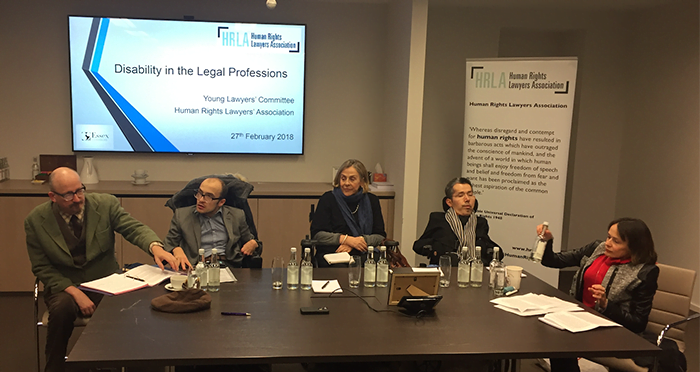Bringing unique benefits

Solicitors and barristers have come together to reveal what it’s really like being a disabled lawyer in London, and to celebrate what one called the “unique benefit” they bring to the profession.
At Disability in the Legal Professions, an event hosted at 39 Essex Chambers, solicitor Jocelyn Cockburn kicked off by discussing the resilience her spinal cord condition has helped her to develop, and how this has helped her practice at Hodge, Jones and Allen.
“Adversity forces us, as disabled lawyers, to be creative and resilient in a way able-bodied lawyers are not,” says Cockburn, who has represented the likes of Stephen Lawrence’s family. Joanna Owen, a lawyer at the Equality Human Rights Commission, cites the spinal cord injury she sustained during a car accident as a reason for her bloody-mindedness, too. Having studied history at undergraduate level, Owen “had an itch [to be a lawyer] that wouldn’t go away”. It was becoming disabled that propelled her into the profession: “Having to navigate life in a world that isn’t always built around our needs… was instrumental in pushing me forward.”
A tough mindset is just one of the benefits disabled lawyers may have over their able-bodied peers; commercial barrister Diego Soto-Miranda names a second. Speaking at the Human Rights Lawyers Association event, he notes his (usually able-bodied) courtroom opponents are sometimes “very shocked” when they see wheelchair user Soto-Miranda on the other side. “It puts them off their game and they don’t know how to handle me,” the 1 Essex Court tenant tells last week’s audience. “My disadvantage becomes my advantage; being underestimated is my best asset, my magic charm.”

A lawyer’s relationship with their client can be strengthened because of the former’s disability, too. Cockburn says she has a “natural affinity” with people who are facing difficulty — her clients — while Owen notes she scored top marks on the client interview section of her Legal Practice Course (LPC) at least in part thanks to her past experiences interviewing assistants to care for her at home.
While it’s clear “there is a real value in being different” (Owen’s words), where disabled lawyers may falter is trying to do the same as their able-bodied colleagues. The billable hours culture can pressure disabled lawyers into trying to keep up with the pack. Josh Hepple, a law graduate and disability rights activist, explains the impact his cerebral palsy can have on his ability to work:
“When I get tired I stop functioning and I must be able to take a break for as long as I need to recover. Many people can fight through fatigue with another coffee or perseverance. I cannot and results could be catastrophic if I was made to work when I’m not feeling right. Everyone in this room probably knows about the huge time demands placed on young trainees as many have to work past midnight if there is a deal about to close. I cannot do this.”
“For a long time, I ignored the impact my job has on my health,” Cockburn admits. Owen agrees: “I became very ill because I was pretending I was like everybody else and could work the same hours as them.”
Reasonable adjustments and working more flexibly can certainly help, for example working from home or travelling into the City outside of rush hour. Cockburn, whose condition impacts her lung function, says she sits with an air filter in her office, and will not travel into work if air pollution is particularly high that day.
Despite this, working as a disabled lawyer comes with many frustrations.
Soto-Miranda reveals that for his first year of practice in the 2000s, he had to be carried up a flight of stairs into chambers and was unable to get out again until the end of the day — “luckily the only fire we had was on a weekend!” While John Horan, Cloisters barrister and panel chair, abhors able-bodied lawyers’ categorisation of their disabled peers as either ‘poor’ or ‘stroppy’. “I have found myself being put in a box on so many occasions,” says Horan, who suffered a life-changing stroke in 1999, the day before the millennium. “If being stroppy means that I argue for human rights, especially the human rights of disabled people, then I’m proud to be stroppy.”
